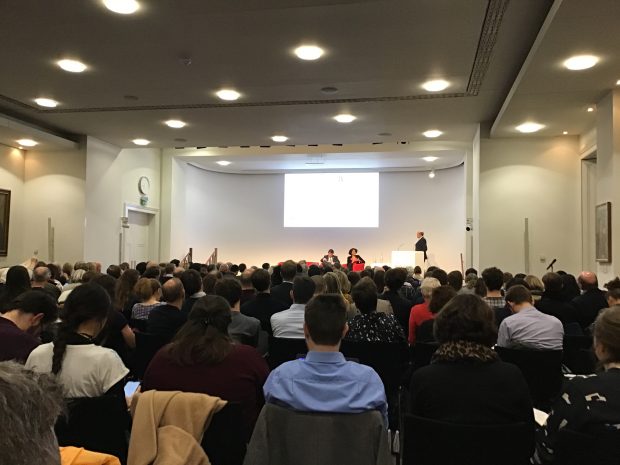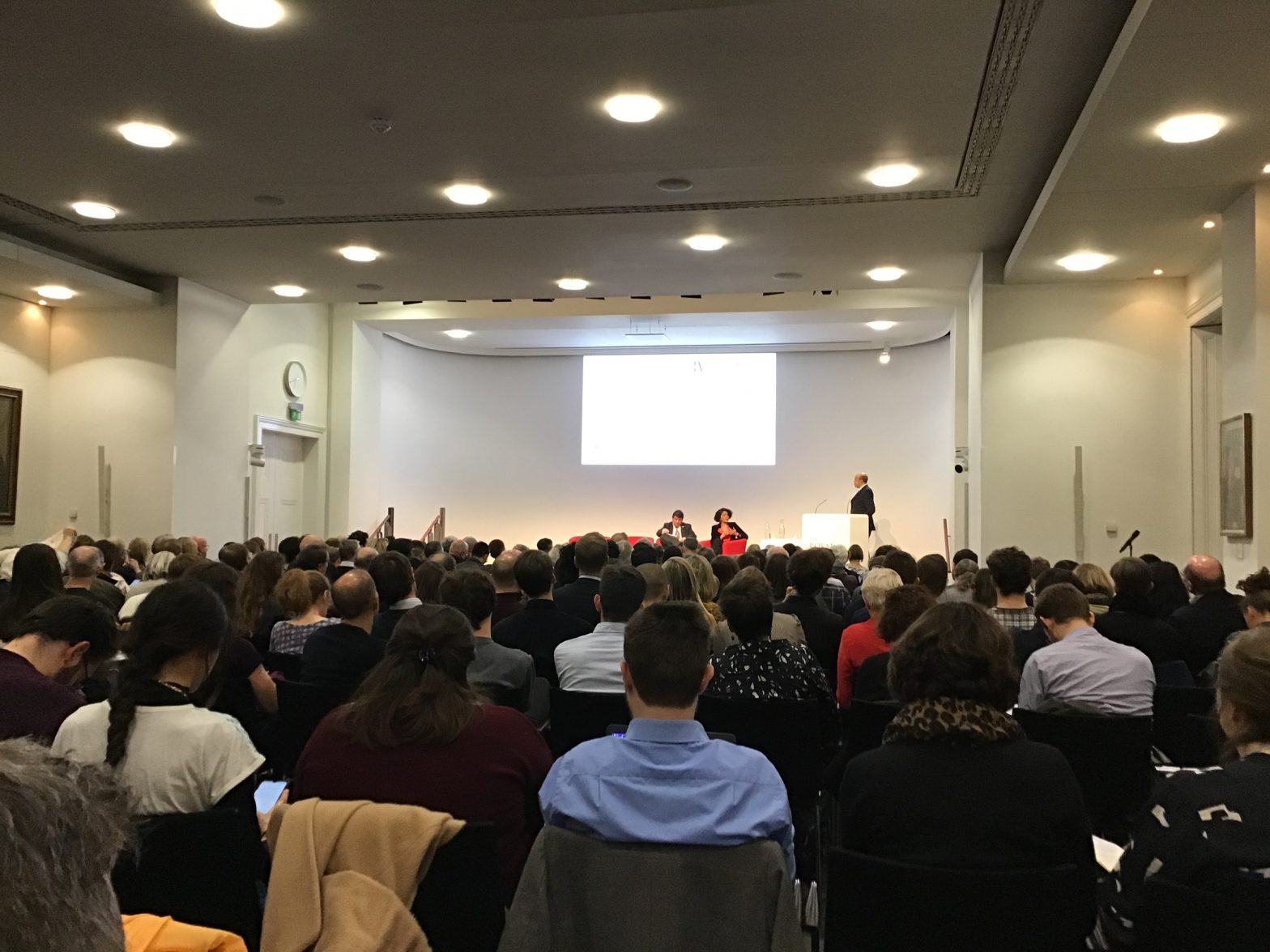Introduction
On the evening of 19 November 2019, in the run-up to the General Election, representatives for science, research, technology and innovation policy from the Conservative, Labour, and Liberal Democrat parties (along with the SNP) were invited to outline their party’s election position on these issues, and answer questions. Stephen Metcalfe (Conservative Party), Chi Onwurah (Labour Party), and Sam Gyimah (Liberal Democrat Party) took part. The event was chaired by the BBC Science Correspondent Pallab Ghosh (@BBCPallab).
The Science, Research, Technology and Innovation General Election Hustings was presented by the Academy of Medical Sciences, the British Academy, the Campaign for Science and Engineering, the Foundation for Science and Technology, the Royal Academy of Engineering and The Royal Society, and hosted at The Royal Society at Carlton House Terrace, London SW1.
The Big Potatoes on Twitter: “#GeneralElection2019 hustings on Science, Research, Technology and Innovation, co-hosted by CaSE (@sciencecampaign), 19/11, with Stephen Metcalfe (@Metcalfe_SBET) [Con] @ChiOnwurah [Lab] @SamGyimah [LibDem] and Pallab Ghosh (@BBCPallab) [chair] #GE2019 https://t.co/G4TP26ifjB pic.twitter.com/zlkl6ybIJA / Twitter”
GeneralElection2019 hustings on Science, Research, Technology and Innovation, co-hosted by CaSE (@sciencecampaign), 19/11, with Stephen Metcalfe (@Metcalfe_SBET) [Con] @ChiOnwurah [Lab] @SamGyimah [LibDem] and Pallab Ghosh (@BBCPallab) [chair] #GE2019 https://t.co/G4TP26ifjB pic.twitter.com/zlkl6ybIJA
Background
For two of the three past General Elections, I’ve co-programmed and hosted events and debates around the themes of this event. For the 2010 election I hosted Innovation, R&D and the General Election with BIG POTATOES, at The Royal Society; and in the 2015 election, I co-hosted ‘If We Build It…’ for The Research & Development Society, at Congress Centre. So it was interesting to see how the debate shaped up this time around. Some of the key themes that came out follow.
Report
Each speaker was invited to give a short overview of their party’s perspectives and possible manifesto policies, with the chair following up with questions. The discussion was then opened out to the audience – with the chair interjecting occasionally – structured around three areas: Brexit and international relations; Education, skills reform and innovation; and the Impact of science advice. The event was well attended, with perhaps 200 in the audience.
Big themes
Onwurah said Labour is committed to creating an ‘innovation nation’, and establishing regional investment banks to invest in important sectors of the economy, and described a Mazzucato-esque combination of an entrepreneurial state and patient finance. She said that Labour will create a National Investment Bank which will have one-third of its funding reserved for R&D [check], and it will move part of the Treasury to the North. She also talked about democratising science and innovation ‘beyond elite institutions’. In her concluding remarks she advocated the idea of a Green Industrial Revolution as a project that could ‘bring people together’.
Metcalfe said the Conservative government has been increasing science funding at a greater rate than at any time in history, and the Conservatives want to increase overall R&D spending to 2.4%, with a goal of spending £18bn of public money by 2024–25.
As a LibDem, Gymiah’s key theme was stopping Brexit, and he talked about the danger of Brexit ‘ripping up institutions’ and allowing others to take advantage, while making it more difficult for scientists from all over the world to come to work in the UK. He advocated free movement continue for ‘the brightest and the best to come and work here’. ‘We have to remain in the EU if we are to advance science’, he said.
CaSE on Twitter: “Research and innovation central to UK’s future for Labour, says @ChiOnwurah – an innovation nation with 3% GDP on R&D by 2030. ‘Crossing fingers’ won’t work and has to change. #ge2019hustings pic.twitter.com/Zj3VOWqma8 / Twitter”
Research and innovation central to UK’s future for Labour, says @ChiOnwurah – an innovation nation with 3% GDP on R&D by 2030. ‘Crossing fingers’ won’t work and has to change. #ge2019hustings pic.twitter.com/Zj3VOWqma8
Gemma Wood on Twitter: “UK is still a global science superpower. Science funding increased at a faster rate than any government in history. Goal is to spend £18bn of public money by 2024/5 @Metcalfe_SBET tells #GE2019Hustings / Twitter”
UK is still a global science superpower. Science funding increased at a faster rate than any government in history. Goal is to spend £18bn of public money by 2024/5 @Metcalfe_SBET tells #GE2019Hustings
The Royal Society on Twitter: “.@SamGyimah from @LibDems: free movement of people essential for collaboration in science. The idea of ‘the brightest and best’ could mean the UK misses out on undeveloped talent. “It’s not always easy to spot a Nobel prize winner when they’re a young researcher” #GE2019hustings / Twitter”
@SamGyimah from @LibDems: free movement of people essential for collaboration in science. The idea of ‘the brightest and best’ could mean the UK misses out on undeveloped talent. “It’s not always easy to spot a Nobel prize winner when they’re a young researcher” #GE2019hustings
Blue skies research
Gymiah noted that basic research is important and ‘can only run so lean for so long’, and that ‘science is about serendipity and we want basic research and multi-disciplinary research rather than politicians trying to game the system too much’. Later he warned against instrumentalism and ‘danger of setting tractor production targets’ (an allusion to Soviet Five Year Plans). Metcalfe noted that ‘if we don’t put enough into blue skies research there won’t be anything to translate [into innovation]’.
Gymiah noted that basic research is important and ‘can only run so lean for so long’ [and we need to avoid] politicians trying to game the system too much
Ambition
Onwurah argued that austerity had been a political choice and had ‘created a poverty of ambition’. Later, in a discussion of net zero emissions targets, observed that ‘when you don’t have ambition, everything seems impossible’.
Onwurah argued that austerity had been a political choice and had ‘created a poverty of ambition’
Brexit, the Withdrawal Agreement and talent
This is the key theme for the LibDems and Gymiah, as noted, and he noted that ‘great science is done by great people’ and believed we need a country which is open and welcoming to them. Onwurah contended that we ‘couldn’t have designed a worse Withdrawal Agreement than the current one for R&D’. Metcalfe argued that ‘once we have Brexit done we can create a system which encourages [companies] basing research and translation in the UK’.
The President of the Royal Society, Venki Ramakrishnan, noted that it is straight forward for people to come from EU to work, but there are ‘an incredible number of hoops’, and considerable cost, for people from outside EU. He also argued the UK’s academic science and research sector had suffered ‘huge reputational damage’ in the last three years as a result of the Brexit process. Onwurah lamented ‘the use of EU citizens as pawns in negotiations with the EU’ and said Labour would end the hostile environment. Gymiah said the government is proposing a strategy which will ‘level down not up’ and that the LibDems ‘want to make it as easy as possible for scientists from all over the world to come [to the UK]’. He also warned of the danger of the UK losing out in the ‘scientific superpower competition’.
‘D’ over ‘R’, translation, and entrepreneurship
There is a widespread view that the UK is overly focused on (scientific) research over the development part of R&D, and that it is poor at translating fundamental insight into real-world impact. Prof Sir Robert Lechler, from the Academy of Medical Sciences, asked why GSK should stay in the UK when only 4% of its market is here, as its CEO Emma Walmsley has noted, and suggested the UK needs academic centres connected to the NHS and able to translate research. Another questioner noted that other countries have a better balance between early-stage research vs translation, and suggested that in the UK perhaps only £1 goes into translation compared to £10 into research. ‘Is research making it through to the marketplace?’ they asked.
Academy of Medical Sciences on Twitter: “Our President Prof Sir Robert Lechler questions the panel: “What steps would your government take to support collaboration across NHS, academia and industry to retain the UK’s thriving life sciences industry?” #GE2019Hustings #GE2019 pic.twitter.com/x1SjeHc2Bh / Twitter”
Our President Prof Sir Robert Lechler questions the panel: “What steps would your government take to support collaboration across NHS, academia and industry to retain the UK’s thriving life sciences industry?” #GE2019Hustings #GE2019 pic.twitter.com/x1SjeHc2Bh
Gymiah noted that there was collaboration between industry and universities in particular areas such as photonics. Metcalfe said that government was taking on board the need to get more ‘R’ translated into the ‘D’.
Venki Ramakrishnan, asking a second question, noted the tendency for entrepreneurial startups to sell out and the potential growth that is lost to the UK, and asked what proposals there were to capture the scale-up potential of these companies. Gymiah noted the LibDems proposed a British Investment Bank and a Green Investment Bank to address the problem of UK capital markets not being deep enough to fund scale-ups. Metcalfe told the story of a couple of young graduates working in the AI area who had sold algorithm ‘for millions’, rather than build a company around it, ‘as they wanted to travel’, and advocated for patient capital and access to funding.
Environments for R&D and universities
Onwurah talked about the need for a broad platform on which competition can thrive. She also noted the need for a denser innovation ecosystem, ‘so people have more choices’, and the need to get transport, communications and other infrastructure up to OECD levels.
Gymiah talked about the need to ‘be clear-eyed about [the role of] open, excellent universities’ and cautioned politicians: ‘Don’t play political football with their funding’. In that context, he noted the Augar Review [of Post-18 education and funding] had been silent on research funding.
Onwurah talked about the need to get transport, communications and other infrastructure up to OECD levels
Encouraging the next generation
Metcalfe talked about the need to excite young people in this area and cited the 2018 Year of Engineering, which has now been made a 3-year programme. Gymiah also emphasised the need for children to be excited about science and the need to find a ‘sustainable way to keep that interest’. Onwurah talked about creating a National Engineering Service with 6 years of free education, though this idea was not clearly explained. Gymiah also cited a new university in Herefordshire [NMITE: New Model in Technology and Engineering] which is teaching engineering to people who haven’t studied it, and is offering broader-based courses.
Initiatives and interventions
Onwurah noted that Labour will set up a Catapult for the retail area, and focus on increasing innovation in areas of the ‘everyday economy’ such as this. The chair noted that Downing Street advisor Dominic Cummings was believed to be keen on science, and wants to create a DARPA-style body in the UK, and Metcalfe said he believed there will be £800 million for this initiative. Gymiah advocated for the existing setup and noted that a lot had been invested in UK Research and Innovation and ‘we need to try and make it work, and we shouldn’t chop and change too much’.
Dominic Cummings was believed to be keen on science, and wants to create a DARPA-style body in the UK

Reflection
The event overall was somewhat ‘motherhood and apple pie’, that is, no one said anything that controversial or radical. Very few proposals were made which weren’t a continuation or extension of current policies. Other the Gymiah and the LibDems proposal to cancel Brexit, which didn’t engender any significant critical debate. Likewise the Green Industrial Revolution advocated by Onwurah and the
Green Investment Bank by Gymiah, while relatively new ideas, were uncontroversial and connection to the Conservative’s narrative.
George Dibb on Twitter: “The big takeaways from #ge2019hustings are that there is a huge amount of agreement – R&D spending needs to increase. Where do they differ? @SamGyimah Brexit is really bad @Metcalfe_SBET we need to get brexit done @ChiOnwurah we need a green science/innovation/jobs strategy / Twitter”
The big takeaways from #ge2019hustings are that there is a huge amount of agreement – R&D spending needs to increase. Where do they differ? @SamGyimah Brexit is really bad @Metcalfe_SBET we need to get brexit done @ChiOnwurah we need a green science/innovation/jobs strategy
However, the aspirational tone was somewhat higher than during recent elections. The value of ‘blue skies’ research is a principle in our BIG POTATOES manifesto I co-authored and it was good to have this advocated by both Gymiah and Metcalfe, particularly Gymiah’s note that basic research is important and ‘can only run so lean for so long’. Likewise, ambition and thinking big is another BIG POTATOES manifesto principle and it was good to have Onwurah champion this.
On the other hand, there were many positive comments about addressing the predominance of research over the development part of R&D, which is a major issue for the Research & Development Society I formerly headed up. However, there was little concrete or insightful said, let alone thoughts about whether the U.S./Silicon Valley model of startup, scale-up, unicorns and IPOs was the right strategy for British-based entrepreneurs.
Laela PakpourTabrizi on Twitter: “At the @royalsociety Science, Technology, Research + Innovation hustings, all 3 major parties commit to prioritise + spend more public money. How do we attract more foreign direct investment + support small and large industry to innovate in the UK? #GE2019Hustings #Publicprivate / Twitter”
At the @royalsociety Science, Technology, Research + Innovation hustings, all 3 major parties commit to prioritise + spend more public money. How do we attract more foreign direct investment + support small and large industry to innovate in the UK? #GE2019Hustings #Publicprivate
Onwurah was interesting on the idea of ‘denser innovation ecosystems’ and getting UK infrastructure up to OECD levels, but the former has often been observed about the Cambridge university/research/industry ecosystem, the Cambridge/London/Oxford biotech triangle, and the Shoreditch/Tech City connurbation. But there were no insights presented from these concrete examples, or even more recent ones such as the King’s Cross Knowledge Quarter.
The role of universities was cited a number of times by Gymiah and he was defensive about their existing funding and roles, but seemed complacent about the related challenges around their ability to synchronise with industry R&D timelines; disincentivising spinouts by demanding too much intellectual property or equity; or making themselves known and relevant, especially to newer industries which don’t have a traditional R&D culture.
Gymiah also seemed to be complacent about UKRI and it’s impact, not least given the criticism of it and its predecessor for instrumentally driving research. Likewise, Onwurah advocated creating another Catapult centre without reflecting on whether the Catapult model had been effective.
On encouraging the next generation, the response were fairly bland and lacking in evidence. My sense is that the dystopic issues such as climate change may actually be demotivating for young people, but there was no challenge to those narratives.
https://twitter.com/Sarah_Cosgriff/status/1196880513274961920?s=20
Discussion about Brexit with an audience of scientists, researchers and policy-makers was always going to be one-sided and Ghosh even alluded to this. Ramakrishnan remark about the ‘huge reputational damage’ the UK research sector had suffered didn’t address the various possible causes of this, including the many attempts to undermine or reverse Brexit prolonging the process; as such, we need to be skeptical about their insights when scientists and researchers opine about political and social issues.
Though there was a clear section of the debate allocated to Brexit and international relations, and the chair sought comments via Twitter, one of the key points made this, from Keith Mansfield, was missed. He noted that Brexit could have a positive impact on UK science and research, and more broadly, in removing the risk-averse regulations which permeate the EU, not least around genetic engineering in agriculture.
x.com
No Description
As such, we need to have a more rounded, deeper and challenging debate than was afforded on this occasion.
Documentation
Text
My livescribed notes on the event:
General Election Hustings: Science, Research, Technology and Innovation, 19/11/2019
No Description
Video
The event was live-streamed and archived on The Royal Society YouTube channel:
Science, research and innovation hustings
At this event, representatives for the major political parties will answer questions about science, research, technology and innovation. This event is being jointly organised by the Academy of Medical Sciences, the British Academy, the Campaign for Science and Engineering, the Foundation for Science and Technology, the Royal Academy of Engineering and the Royal Society.
I may add time-coded links to particular speakers’ comments.
Social media
See Tweets tagged #GE2019Hustings
If you would like to re-publish or syndicate this story please contact Nico Macdonald

